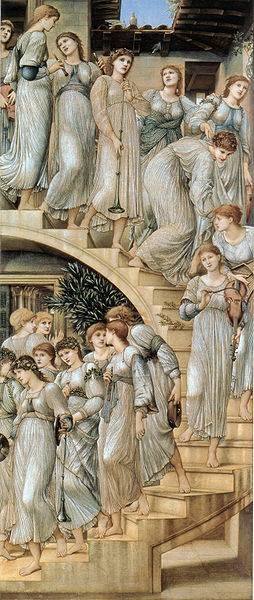 1
1title: Edward Burne Jones.The last sleep of Arthur
artist: Edward burne-jones
date: 1898
source: link via English Wikipedia
credit: link via English Wikipedia
description: A detail of the painting The last sleep of Arthur by the Pre-Raphaelite painter burne-jones">Edward burne-jones.
license:Public domain
 2
2title: Beguiling of Merlin
artist: Edward burne-jones
date: 1874
medium: Oil on canvas
dimensions: Size cm 186 111
source: Scanned from Wildman, Stephen: ''Edward burne-jones: Victorian Artist-Dreamer, Metropolitan Museum of Art,'' 1998, ISBN|0870998595
credit: Scanned from Wildman, Stephen: Edward burne-jones: Victorian Artist-Dreamer, Metropolitan Museum of Art, 1998, ISBN 0870998595
license:Public domain
 3
3title: Edward Burne Jones The Golden Stairs
artist: Edward burne-jones
date: 1880
medium: technique oil canvas
dimensions: size cm height=269 width=116
current location: <!-- room|1840 --> Institution:Tate Britain
source: Scanned from Wildman, Stephen: ''Edward burne-jones: Victorian Artist-Dreamer,'' Metropolitan Museum of Art, 1998, ISBN|0870998595 Credit line|Author=Original photography created by Tate Photography Department|License=CC-BY-NC-ND 3.0 (Unported)
credit: Scanned from Wildman, Stephen: Edward burne-jones: Victorian Artist-Dreamer, Metropolitan Museum of Art, 1998, ISBN 0870998595
license:Public domain
 4
4title: Burne Jones Last Sleep of Arthur in Avalon v2
artist: Edward burne-jones
date: from 1881 until 1898
medium: technique painting
current location: Museum of Art in Ponce Puerto Rico
source: Scanned from Christopher Wood, ''burne-jones'', Phoenix Illustrated, 1997, ISBN|9780753807279
credit: Scanned from Christopher Wood, burne-jones, Phoenix Illustrated, 1997, ISBN 9780753807279
license:Public domain
 5
5title: Georgiana Burne Jones by Edward Coley Burne-Jones
artist: Edward burne-jones
date: 1883
medium: Oil on canvas
dimensions: size cm 76 53
current location: <!-- within the institution-->
source: [link Sotheby's]
credit: Sotheby's
description: Georgiana burne-jones, their children Margaret and Philip in the background
license:Public domain
 6
6title: GardenHesperides BurneJones
artist: Edward burne-jones
date: circa 1869
medium: Technique tempera and=gouache and2=oil canvas mounted=cardboard
dimensions: size cm 119 98
current location: Institution:Hamburger Kunsthalle
source: [link preraphaelitepaintings.blogspot.com]
credit: preraphaelitepaintings.blogspot.com
license:Public domain
 7
7title: Portrait of Georgiana Burne-Jones (1840-1920)
artist: Edward burne-jones
date: 1863
credit: JAE437bkV1Y6ew at Google Cultural Institute, zoom level maximum
license:Public domain
 8
8title: Maria Zambaco - Profile Study
artist: Edward burne-jones
date: 1866
credit: YgECpIiTUoeCdA at Google Cultural Institute, zoom level maximum
license:Public domain
 9
9title: Garden of the Hesperides
artist: Edward burne-jones
date: between 1869 and 1873
medium: Technique tempera and=gouache and2=oil canvas mounted=cardboard
dimensions: size cm 119 98
current location: Institution:Hamburger Kunsthalle
source: bridgemanart|141605
credit: The Bridgeman Art Library, Object 141605
license:Public domain

title: Saint Cecilia
artist: Edward burne-jones
date: circa 1900
medium: Stained and painted glass
dimensions: Size unit=cm height=213.5 width=75.5 <br> frame: Size unit=cm height=235 width=88.7 depth=4
current location: Institution:Princeton University Art Museum
source: w|Princeton University Art Museum
credit: Princeton University Art Museum
description: Catalogue Entry:
One of nearly thirty versions of a window designed by burne-jones and executed by the company founded by William Morris (1834–1896), Saint Cecilia is a product of the Arts and Crafts movement they initiated. Friends at Oxford, Morris and burne-jones became disciples of John Ruskin and the Pre-Raphaelite movement and put into practice his vision for the renewal of art. They sought to counter the effects of the machine age by reviving medieval crafts, abolishing distinctions between fine and decorative arts, and beautifying objects of everyday life. Morris wrote on the philosophy of art and founded a company to execute textiles, wallpaper, and other objects, while burne-jones, in addition to painting and sculpting, studied with the Pre-Raphaelite painter Dante Gabriel Rossetti and designed murals, tapestries, and stained glass for Morris’s company.
The Gothic Revival style in architecture created a market for stained glass, especially in the 1870s, when burne-jones was a particularly prolific designer of windows. The first Saint Cecilia window, at Christ Church, Oxford (1875), shows the influence of the early Renaissance art he had seen in central Italy, most recently in 1871. The flat, abstracted, linear style and the wilting pose of the impossibly tall, graceful woman make reference to the work of Botticelli (Florentine, ca. 1445–1510), while the tapestry-like screen of pomegranate trees and fruits and the richly patterned brocade fabric recall the latest Gothic phase of Italian art, about 1400.
Saint Cecilia, an early Christian Roman virgin martyr, became the patron saint of music and was portrayed with an organ — here, a portable organ of the fifteenth century. Although water organs existed in the ancient world, pipe organs date from the fourteenth century, so we must assume Cecilia is singing the praises of God in heaven, not during her earthly life. In the window at Christ Church, she is flanked by lancet windows with music-making angels; scenes from the life of a fellow martyr saint, Valerian, and her own martyrdom are shown below. In Chicago, a Saint Cecilia window was included in the stained glass of the Second Presbyterian Church (1904); there, the fabric behind the saint is blue, and the tree bears lemons, demonstrating the permutations that could occur among these windows.
Gallery Label:
burne-jones and Morris devoted their lives to social change through the arts—burne-jones as a painter and Morris, originally trained as an architect, as founder of the design firm that, in 1875, became Morris & Co. In their quest to improve the level of taste in interior furnishings, the firm designed stained-glass windows, murals, furniture, metal-and glassware, jewelry, and other decorative items, in addition to the textiles and wall coverings for which Morris & Co. is best known. burne-jones was Morris & Co.’s foremost stained-glass designer, creating windows for both ecclesiastical and domestic use.
The organist of Christ Church Cathedral, Oxford, commissioned the initial Saint Cecilia design in 1875. The cathedral is famous for its choir, so the patron saint of music is an apt subject for the window. Cecilia, occupying the central vertical panel, plays the organ. At Oxford, two angels in flanking panels hold other instruments, and the story of Cecilia’s martyrdom is depicted in the three rectangular panels below. burne-jones’s cartoons, or full-scale designs, were reused for a number of window commissions, even after his death; the figure of Cecilia changes only slightly from window to window, but the colors and backgrounds vary. The Museum’s window perhaps originated as a private domestic commission, perhaps for a dining room, an entertainment space where the musical motif would be suitable.license:Public domain





